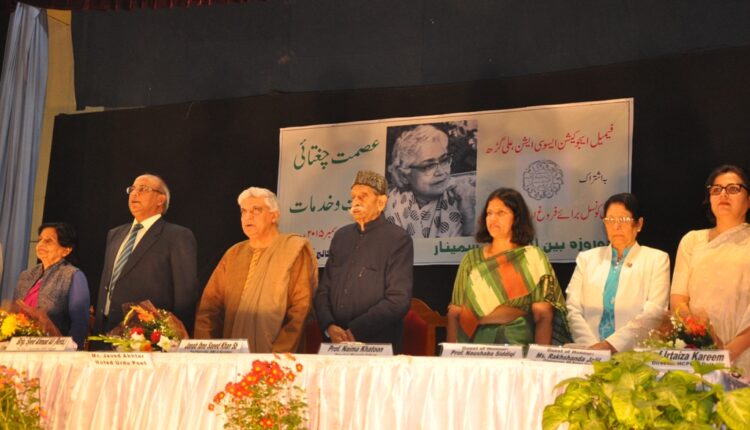The conversation takes place between Ismat Chughtai and Javed Akhtar. Ismat Chughtai was a prominent 20th century Urdu writer who wrote on class issues, female sexuality, and feminism, and whose 105th birth anniversary was celebrated on August 21. Her views on social issues, such as same-sex relationships, are now recognized as being decades ahead of her time. Javed Akhtar is a prominent 21st-century lyricist, poet, and screenwriter.
Both of them faced opposition from their respective worlds because of their literary works. And both of their lives hold indispensable lessons on how literature and India can cope in these times of majoritarianism.
Read on and immerse yourself in a literati colloquy …
“I have always thought of myself first as a human being and then as a woman…”, Ismat had just penned these lines when she heard Javed approaching. The two legends, irrespective of their time and situations, were face to face. There they were, right next to each other, brought together by the imagination of students. For these students, literature had always been a tool to understand their world. This time, it was with the help of two stalwarts of AMU—both of them masters of the craft of literature.
Walking over to the side of her desk, Javed reads the words which were some of Ismat’s finest. With the look of a man exasperated by the irrational bigotry of his times, Javed says with his characteristic gentle demeanour: “As evil descends over us all like a cloud of tear gas, the importance of literature like yours to give a voice to the oppressed is paramount. The tear gas has even spread to our alma mater. My India is besieged by bheedtantr and dandaniti. People have abandoned their senses and have been wooed by demagogues. The march of progress is being halted by the machinations of men who only want to hold onto power. They refer to our neighbour countries citizens’ as “termites”. They refer to our own citizens as “gaddars”. Evil has extended its grip over our country, gently corrupting and forcibly subjugating the people. I fear for the future of India, Ismat aapa.” Both their worlds had a gazillion problems to ponder upon and mourn. Time flies and problems change—but they always persist in some form.
Ismat looks at Javed. She smiles a smile of understanding. Speaking with the experience of age, 76 years as a mortal being, and 29 years as an apparition, Ismat takes off her glasses and replies, “I lived in a time of imperial domination. Your India may face tear gas, Javed. But mine faced poison gas. My world was harsher than yours. More evil, more wicked. Monsters in white skin stalked the lands. The things they did were far worse than your India suffers. Corruption and subjugation are tourists in your world, Javed—but they were residents in mine. My world’s writers fought them back with words, just like yours are doing. Evil may march supreme over the land and may censor every voice of dissent—but stifled voices are like the roots of a tree: they always find a way. Literature always finds a way. The brevity of the mob and brutality of the establishment cannot stifle voices for long. A writer need only resist the pressure of conformity and persist with his intellectual integrity.”
Every inch of these words was as clear as sky: inspiring, mighty, and consistent. Their clarity inspired Javed. A smile spread over his face—-a smile of reinvigorated hope in his world. “I suppose you are right. Things might be bad, but they are certainly better than they used to be. The wheel of progress might be hindered for a while, but it always marches forward. The wisdom of your written word is only matched by the wisdom of your spoken word. I remember those days when I would meet you. I remember how close you were to my mother. How I cherish those times.”

He pondered over Ismat’s words; he mulled them over. An idea had taken seed in his mind. Everyone who reads Urdu literature comes across the works of Ismat Chughtai. And they always find nuggets of wisdom which inspire them. The old world and its legends always act as muses for the new world and its writers. Even for a writer as great as Javed Akhtar.
A few seconds later, Javed emerged from his intellectual stupor. His eyes twinkled with inspiration. He gently took a pen and piece of paper from Ismat’s desk and penned the lines which would be some of his finest, “Ghalat baaton ko khaamoshi se sunna, haami bhar lena, bahut hain fayede iske, magar achcha nahi lagta….”
—————————————————————————————————————-
—by Sadaf Afreen and Mukund Sharma
Sadaf Afreen is a student of MA Literature at AMU. Mukund Sharma is a BA student who studies literature and economics at AMU. He is also a member of Students for Liberty, a non-profit organization which seeks to create a freer future for all.



